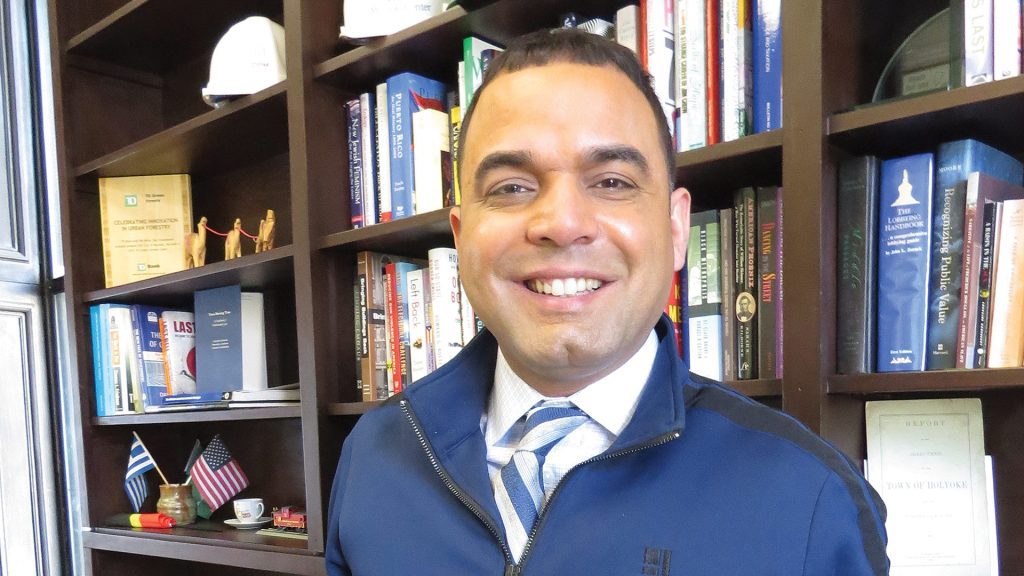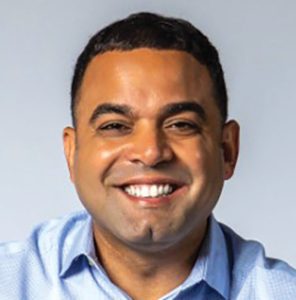Sidebar

Joshua Garcia
Joshua Garcia says that, among his friends, family, and colleagues at various career stops, there was always an expectation that that he would someday run for mayor of Holyoke. And not just run, but win.
“Even when I was a kid … people would say ‘this young man one day is going to run for mayor, should be mayor,’” he said, adding that it took a while before he eventually started believing — and acting on what people were saying.
Born and raised in Holyoke, he attended city schools and spent much of his time at the Holyoke Boys & Girls Club, where he would later work. Starting at an early age, he got deeply involved in the community.
That involvement included stints on the School Committee, the Fire Commission, Nueva Esperanza, an agency devoted to promoting entrepreneurship and spurring economic development in the city, and other groups. Meanwhile, on the career side, he was gaining experience in the management of municipalities, early on at the Holyoke Housing Authority (while he was also earning a master’s degree in Public Administration), then with the Pioneer Valley Planning Commission, which he served as municipal services coordinator, and later as town manager of Blandford, population 1,200.
That blend of professional growth and community involvement would earn Garcia a 40 Under Forty plaque from BusinessWest in 2015. Meanwhile, each of these stops seemed to bring him closer to that ‘someday’ when his friends and family thought he would run for mayor, and that day came last year, and an election that would determine a successor to Alex Morris, who left Holyoke City Hall to become town manager of Provincetown.
“I started getting the questions again … it was election time, and people were saying ‘why aren’t you running for mayor?’” he recalled. “My answer was that I liked my career track — it was great being a town manager of a town where I could go home at the end of the day and spend time with my family.”
It was with some prodding from his wife, Stefany, (Garcia actually called it an “endorsement”) that he was eventually swayed to become the seventh candidate to declare for the position.
“What many don’t realize is that small towns have their own set of unique challenges that can be just as challenging as a large city.”
“That endorsement really sealed the deal for me,” he told BusinessWest. “She just simply said that, in her opinion, being mayor of the City of Holyoke, knowing who I am, is bigger than her family. I thought that was a very humble and unselfish response. We talked more about what that meant …and felt strongly that if running for mayor to help more people is the sacrifice, then why not?”
He would eventually triumph in that crowded race, becoming the city’s first Puerto Rican mayor. He commenced finishing Morse’s unfinished term in November, and started his own first term in January.
Garcia moves into the corner office at a time when Holyoke is in what most would call a growth mode, especially when it comes to jobs, new business development, housing, and overall vibrancy. As the story on page 14 relates, the city has benefited tremendously from the strong five-year start of the cannabis industry, with many of its long dormant or underutilized mills roaring back to life as homes to a wide array of cannabis-related businesses.
But there is more to the story than this one industry, he said, adding that, even during a pandemic, many new businesses have opened across several sectors, especially hospitality.
“During the pandemic, when restaurants everywhere were shutting down, Holyoke was opening six new ones,” said the mayor, adding that the EforAll Holyoke, the nonprofit created to inspire would-be entrepreneurs and help them get started and to the proverbial ‘next stage,’ has helped create a wave of entrepreneurial energy that is bringing new businesses to the downtown and other areas, and also creating more interest in the city as a place to live.
While all this is positive, said Garcia, these forces are spawning some new and different challenges for Holyoke, especially when it comes to the affordability that has defined it for decades now.
“There’s a tidal wave that’s coming in a very positive way, but it’s going to create a new set of challenges that we’re going to have to figure out,” he told BusinessWest. “One of them is affordability. No one wants to be in a situation where they are priced out of their neighborhood. Costs are rising everywhere, not just in Holyoke but around the region. How to move forward and embrace these new quality-of-life activities that are going on, but also balance that with making sure we’re not pricing people out of the neighborhoods they grew up in. And that’s why affordable housing continues to stay in the forefront.”
While focusing on these issues, Garcia said he will also concentrate on how Holyoke is managed, with an eye toward improvement. And as he goes about that work, he will take some lessons from his last assignment.
Indeed, while Blandford and Holyoke are seemingly worlds apart when it comes to the size and nature of the communities, Garcia said he can draw on his experience serving that hilltown in his new role in the Paper City, especially when it comes to creativity — in management and finding solutions to problems.
“What many don’t realize is that small towns have their own set of unique challenges that can be just as challenging as a large city,” he explained. “The greatest benefit for a city of Holyoke’s size is capacity and resources — you have enough resources to hire full-time department heads and experts to help mitigate liability and meet mandates.
“In a town, you have the same expectation, but you have to be very creative in how you can keep and be competitive, meet needs and mandates, and maintain quality of life,” he went on. “Here, I make a call to a department, and I have someone on a grant, writing and executing it, and doing things. In a town, I’m it, with part-time people or volunteers; so oftentimes, the skill you build working in a small town is the ability to be as creative as you can to meet needs for the community.”
Elaborating, he said that, while Holyoke does have capacity and resources, the growth in new businesses, an unprecedented influx of federal money through ARPA (The American Rescue Plan Act of 2021) and other sources, and a growing mix of challenges and opportunities is putting the city to the test.
“The new challenge internally is the capacity to execute from start to finish,” he said. “In my campaign, I didn’t engage in any of the traditional rhetoric involved in campaigns; instead, I focused on the need for management. My focus with this budget season is to help departments build up so that they’re in a much better position to effectively carry out the responsibilities they’re charged with, and keep up with these projects.
“Holyoke’s form of government, with the mayor as the city manager, is antiquated,” he went on, adding that, overall, he’s working toward reducing or eliminating what he called ‘learning curves’ — in the mayor’s office and elsewhere in City Hall, and perhaps adding a city manager, comptroller, or other positions.
“Whatever model the city decides to go forward with, the idea is to strengthen internal controls and better mitigate harm and liability,” he went on. “Those are some of the longer-term objectives, and it’s going to require the community coming together, between this office, the City Council, and residents, because we’re talking about ordinance and charter changes, potentially.”
George O’Brien
 We are excited to announce that BusinessWest has launched a new podcast series, BusinessTalk. Each episode will feature in-depth interviews and discussions with local industry leaders, providing thoughtful perspectives on the Western Massachuetts economy and the many business ventures that keep it running during these challenging times.
We are excited to announce that BusinessWest has launched a new podcast series, BusinessTalk. Each episode will feature in-depth interviews and discussions with local industry leaders, providing thoughtful perspectives on the Western Massachuetts economy and the many business ventures that keep it running during these challenging times.















